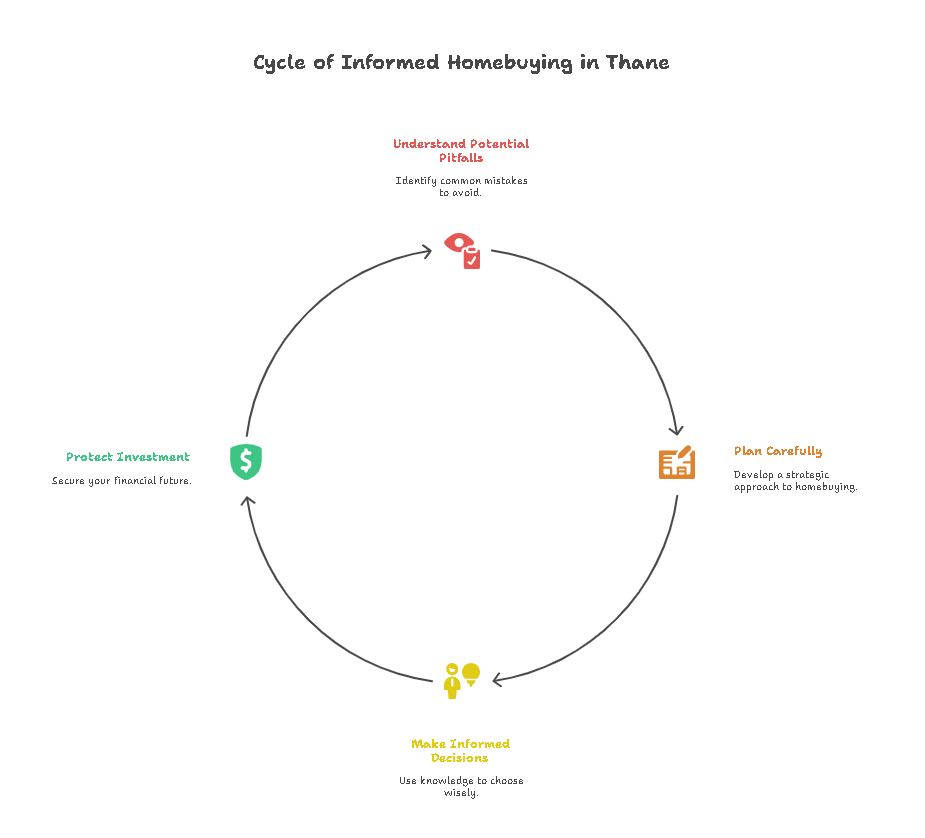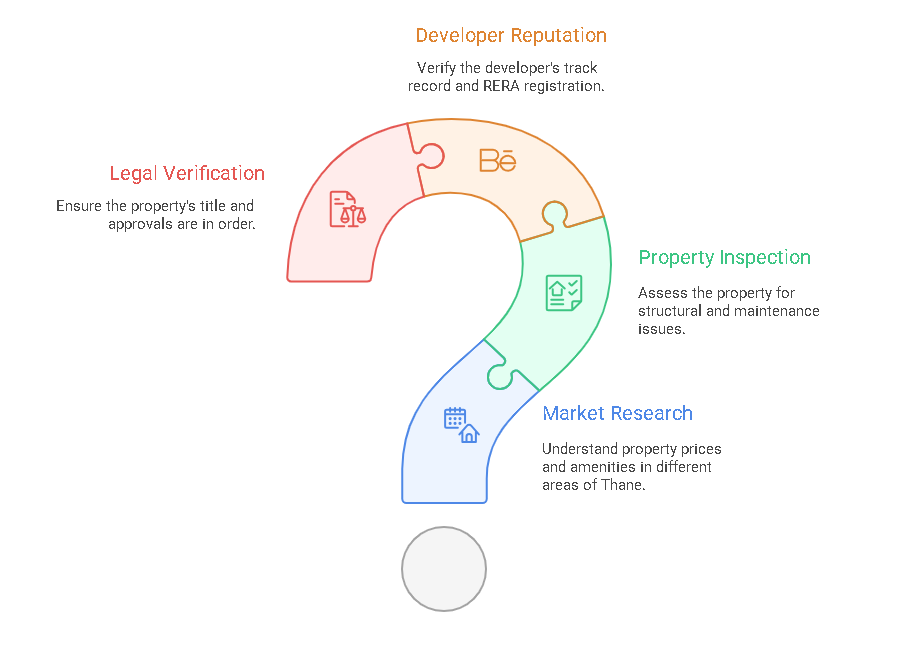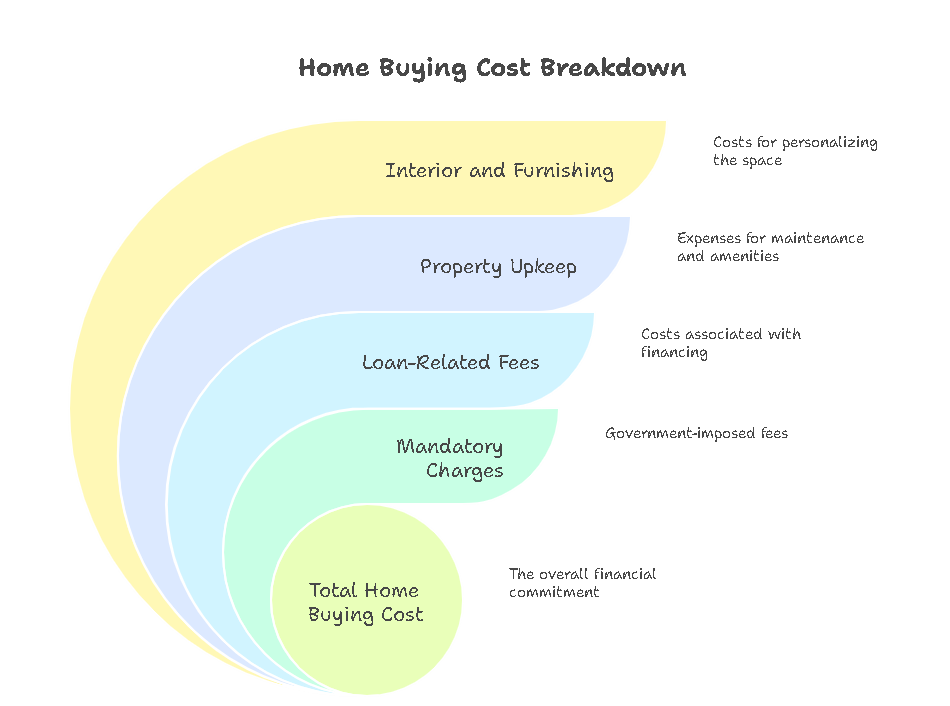
This document outlines common mistakes first-time homebuyers in Thane make and provides actionable advice on how to avoid them, ensuring a smoother and more secure investment. Buying your first home is a significant milestone, but navigating the Thane real estate market requires careful planning and awareness. By understanding these potential pitfalls, you can protect your investment and make informed decisions.

1. Insufficient Research and Due Diligence
The Mistake: Jumping into a purchase without thoroughly researching the market, the property, and the developer.
Why it Matters: Lack of research can lead to overpaying, buying a property with hidden issues, or dealing with an unreliable developer.
How to Avoid It:
- Market Research: Understand current property prices in different areas of Thane (e.g., Ghodbunder Road, Majiwada, Kolshet Road). Compare prices per square foot, amenities offered, and connectivity. Use online portals, consult with real estate agents, and attend property exhibitions.
- Property Inspection: Hire a qualified home inspector to assess the property for structural issues, plumbing problems, electrical faults, and pest infestations. Don’t rely solely on the developer’s assurances.
- Developer Reputation: Research the developer’s track record. Check online reviews, visit their completed projects, and verify their registration with RERA (Real Estate Regulatory Authority). Look for a history of timely project delivery and quality construction.
- Legal Verification: Engage a lawyer to verify the property’s title, approvals, and encumbrances. Ensure all necessary permissions from local authorities (e.g., Thane Municipal Corporation) are in place.

2. Overlooking Hidden Costs
The Mistake: Focusing solely on the base price of the property and neglecting additional expenses.
Why it Matters: Hidden costs can significantly increase the overall financial burden and strain your budget.
How to Avoid It:
- Stamp Duty and Registration Charges: These are mandatory government charges that can amount to a substantial percentage of the property value. Factor them into your budget.
- GST (Goods and Services Tax): GST is applicable on under-construction properties. Understand the applicable rate and include it in your calculations.
- Home Loan Processing Fees: Banks and financial institutions charge processing fees for home loans. Compare fees across different lenders.
- Maintenance Charges: Understand the monthly or annual maintenance charges for the property. These charges cover building upkeep, security, and amenities.
- Parking Charges: If parking is not included in the base price, factor in the cost of purchasing or renting a parking space.
- Interior Design and Furnishing: Set aside a budget for interior design, furniture, and appliances.
- Property Tax: Understand the annual property tax liability.
3. Ignoring Location and Connectivity
The Mistake: Prioritizing price over location and connectivity.
Why it Matters: A poorly located property can lead to difficulties in commuting, accessing essential services, and reduced resale value.
How to Avoid It:
- Proximity to Workplace: Consider the distance and travel time to your workplace. Look for properties with good connectivity to major business hubs.
- Access to Essential Services: Ensure the property is close to schools, hospitals, markets, and other essential services.
- Public Transportation: Check the availability of public transportation options, such as buses, trains, and metro lines.
- Future Development Plans: Research upcoming infrastructure projects in the area, such as new roads, metro lines, or commercial developments. These projects can significantly impact property values.
- Social Infrastructure: Evaluate the availability of recreational facilities, parks, and entertainment options in the vicinity.
4. Rushing the Home Loan Process
The Mistake: Accepting the first home loan offer without comparing terms and conditions.
Why it Matters: A poorly chosen home loan can result in higher interest rates, unfavorable repayment terms, and unnecessary financial burden.
How to Avoid It:
- Compare Interest Rates: Shop around for the best interest rates from different banks and financial institutions. Consider both fixed and floating interest rates.
- Check Loan Tenure: Choose a loan tenure that aligns with your financial capacity. A shorter tenure results in higher EMIs but lower overall interest paid.
- Understand Loan Terms: Carefully review the loan agreement and understand all terms and conditions, including prepayment penalties, foreclosure charges, and late payment fees.
- Check Eligibility Criteria: Ensure you meet the eligibility criteria of the lender, including income, credit score, and employment history.
- Consider Government Schemes: Explore government schemes like the Pradhan Mantri Awas Yojana (PMAY), which offer subsidies to eligible first-time homebuyers.
5. Neglecting Future Needs
The Mistake: Buying a property that doesn’t accommodate future needs and lifestyle changes.
Why it Matters: A property that is too small or lacks essential features can become unsuitable as your family grows or your lifestyle evolves.
How to Avoid It:
- Family Size: Consider your current and future family size when choosing the size of the property.
- Lifestyle: Think about your lifestyle and hobbies. Do you need a home office, a garden, or a space for entertaining guests?
- Resale Value: Choose a property with good resale potential. Consider factors such as location, amenities, and construction quality.
- Flexibility: Look for properties that offer flexibility for future renovations or expansions.
6. Ignoring Legal Documentation
The Mistake: Overlooking the importance of proper legal documentation and verification.
Why it Matters: Incomplete or incorrect documentation can lead to legal disputes and financial losses.
How to Avoid It:
- Sale Agreement: Carefully review the sale agreement and ensure all terms and conditions are clearly stated.
- Title Deed: Verify the title deed to ensure the seller has clear ownership of the property.
- Encumbrance Certificate: Obtain an encumbrance certificate to confirm that the property is free from any legal dues or liabilities.
- Completion Certificate: Ensure the developer has obtained a completion certificate from the local authorities.
- Occupancy Certificate: Obtain an occupancy certificate before moving into the property.
7. Emotional Decision-Making
The Mistake: Letting emotions cloud judgment and making impulsive decisions.
Why it Matters: Emotional decisions can lead to overpaying for a property or overlooking potential problems.
How to Avoid It:
- Set a Budget: Determine your budget and stick to it.
- Prioritize Needs: Focus on your needs and priorities rather than getting caught up in superficial features.
- Seek Expert Advice: Consult with real estate agents, financial advisors, and legal professionals.
- Take Your Time: Don’t rush into a decision. Take your time to evaluate all options and make an informed choice.
Conclusion
Thane is undoubtedly one of the most promising real estate destinations in India today. Its combination of strategic location, green surroundings, and rapid infrastructure growth makes it an attractive place for first-time homebuyers. However, avoiding the common mistakes listed above is essential to ensure your first investment is safe, rewarding, and stress-free.
By conducting thorough research, planning finances wisely, and prioritizing long-term needs, you can make a well-informed decision and truly enjoy the pride of homeownership in Thane.

Join The Discussion